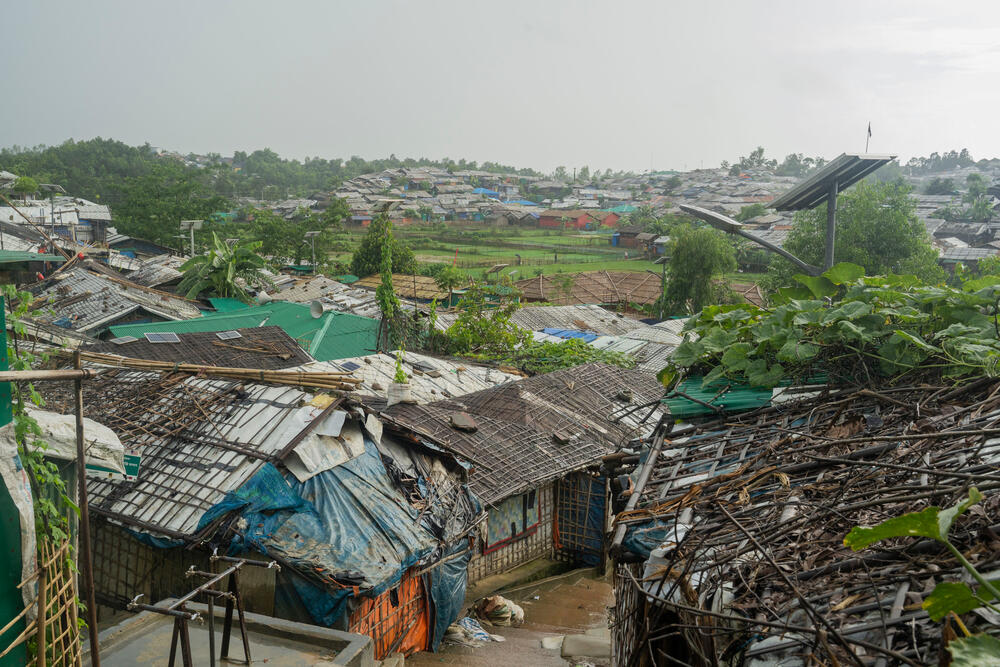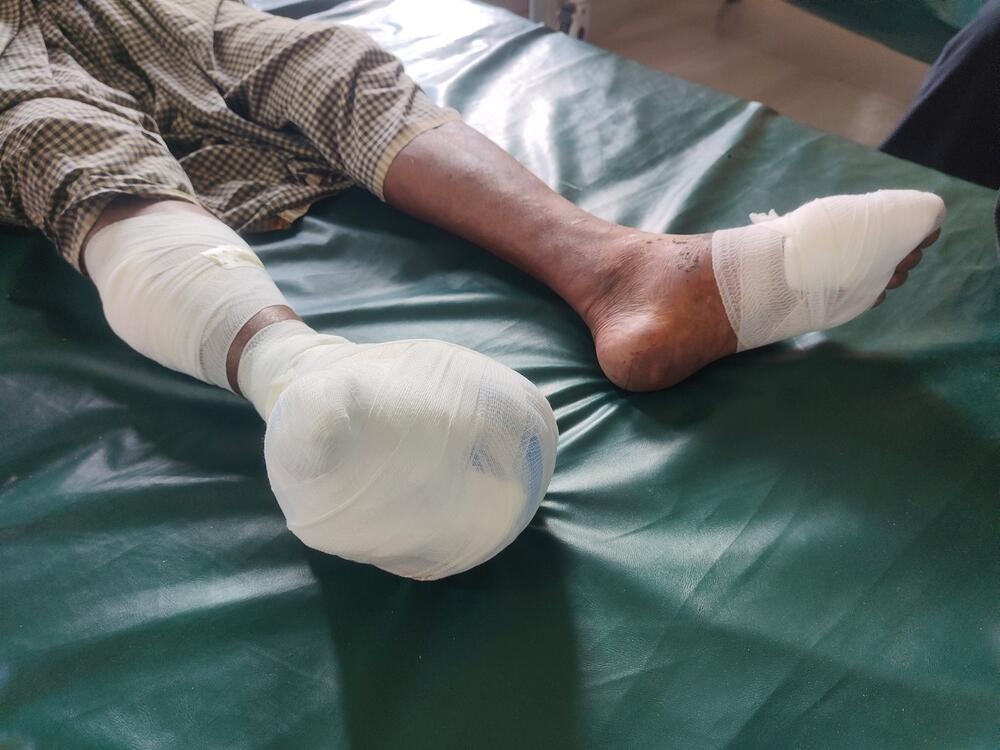Rohingya crisis: Trapped and forgotten in Myanmar
As Rohingya people become increasingly trapped by raging conflict in Myanmar's Rakhine state, those who cannot pay their way across the border into Bangladesh are being left without protection or assistance.
25 August marked seven years since the Myanmar military waged the largest campaign of targeted violence against the Rohingya, an Islamic ethnic minority group, killing thousands and forcing more than 700,000 people to flee their homes and seek refuge in Bangladesh.
Since last November, conflict is again ravaging Rakhine, a state in the west of Myanmar near the border with Bangladesh. The anniversary arrives at a time when people are enduring horrific forms of violence, and are left with virtually no access to healthcare due to the insecurity and restrictions in place.
“We heard explosions, gunfire and people screaming,” says Ruhul, a young Rohingya man, describing the moment when his township, Buthidaung, was attacked on the evening of 17 May. “My family and I fled our home in the chaos, seeking safety in the nearby hills.”
“I became separated from my parents and spent several days hiding in the jungle with my cousins and other young people, in hunger and fear. I stepped on two landmines; the first time I was unharmed, but the second explosion blew my foot off.”
Ruhul didn't receive medical care for nine days until he was able to cross the border into Bangladesh and reach a Médecins Sans Frontières / Doctors Without Borders (MSF) hospital in Cox's Bazar refugee camp.
Since November 2023, Myanmar’s northern Rakhine state has been devastated by intensifying conflict between the Myanmar Armed Forces and the Arakan Army, an armed group in Rakhine. Extreme violence, including the use of heavy weaponry, drone strikes and arson attacks, has razed entire villages, killing, injuring and displacing civilians. Both sides of the conflict are forcibly recruiting civilians and stoking ethnic tensions between communities.
The violence is impacting various ethnic groups living in Rakhine, however as one of the most historically persecuted groups over decades, the Rohingya community are often caught in the middle of it.
On 17 and 18 May in Buthidaung, civilian homes and property were burnt to the ground, and thousands of Rohingya people (including many who had previously fled from other areas) fled the township.
Surging violence
Mojubullah is another Rohingya man who was displaced from Buthidaung on the same day.
“A mortar shell struck our home, killing my wife and injuring several others,” he says. “We made the heartbreaking decision to leave for Bangladesh. Leaving behind our home, livestock and crops was incredibly difficult.”
In Maungdaw, around 12 miles to the west of Buthidaung, intense clashes between the warring parties spiked in May and have again escalated in August. They were characterised by violent attacks on groups of Rohingya people – some of whom are survivors of the attacks in Buthidaung.
Between 5 and 17 August, MSF teams in Bangladesh's Cox’s Bazar camps treated 83 Rohingya patients with violence-related injuries; 48 percent were women and children. They reported fleeing an attack in Maungdaw and crossing the border.
These patients that arrived at MSF's facilities were suffering from gunshot wounds and maimed from landmine injuries. Some were in a critical condition due to a lack of medications to manage life-threatening illnesses such as HIV or tuberculosis. These medicines are no longer available in Rakhine.

Help us prepare for the next emergency
"Health facilities can’t function, having been damaged by the fighting, stripped of medical staff who fled violence, or left without supplies."
Several people described the journey across the border as perilous. As the border is officially closed, people are forced to pay huge bribes to authorities, armed groups or smugglers to cross.
“The journey was marked by challenges at every turn,” says Mojibullah. “We encountered smugglers demanding exorbitant fees for a dangerous boat ride and we faced hostility from border guards upon arrival in Bangladesh.
“Despite our pleas for help, including the urgent medical needs of my grandchildren, we were pushed back to Myanmar.”
In northern Rakhine, access to healthcare is almost non-existent. Health facilities can’t function, having been damaged by the fighting, stripped of medical staff who fled violence, or left without supplies.
Witness to a crisis
In June, MSF was forced to indefinitely suspend our medical humanitarian activities in Buthidaung, Maungdaw and Rathedung townships in Myanmar, after our office and medical store were burnt down.
Before this suspension, MSF witnessed attacks in highly populated civilian areas like markets and villages as well as attacks on healthcare facilities which threatened the lives of patients and healthcare workers.
Minimal effort has been taken by the warring parties to protect civilians and uphold their obligations under international humanitarian law.
The toll of this disregard for human life is immense. MSF teams in Bangladesh received 115 war wounded Rohingya patients in MSF facilities since July 2024 including men, women and children sustaining injuries from extreme violence.
While newly-arrived Rohingya people in Cox's Bazar have managed to escape the conflict zone and access some level of medical care, they are forced to constantly hide for fear of deportation back to Myanmar. They also face an increasingly precarious situation in camps where 1.2 million people are living behind barbed wire fences.
Aside from rising violence and kidnapping in the camps, many people live in fear and anxiety about what they have experienced, and the fate of their families in Bangladesh and back home.
Having finally reached Bangladesh, Mojibullah has not yet found a reprieve from hardship. “My family and I are struggling to come to terms with the loss of loved ones and the uncertainty of our future.”
According to UN figures, approximately 327,000 people have been displaced in Rakhine state and Paletwa Township in Chin state since the conflict in Myanmar resumed in November 2023. In addition to those already displaced, this brings the total number of displaced in Rakhine State and Paletwa Township in Chin to over 534,000 people.
MSF is calling parties to this conflict to comply with their obligations under international humanitarian law and the principles of distinction, proportionality and precaution. This includes protecting civilians from direct attacks and the effects of attacks, as well as the prohibition of indiscriminate attacks.
We also ask the authorities and all actors on both sides of the border to urgently prioritise increased, impartial humanitarian and medical assistance to those in need.
MSF in Bangladesh
Hundreds of thousands of Rohingya have sought refuge in Bangladesh but now live in a precarious situation.
Médecins Sans Frontières/Doctors Without Borders (MSF) has worked in Bangladesh since 1985 and in 2017 we rapidly scaled up our operations in Cox’s Bazar in response to a massive influx of refugees after a renewed wave of targeted violence by the Myanmar military.
In the overcrowded settlements where most Rohingya live, water and sanitation activities are an important part of our efforts to stop the spread of disease. Our clinic in Cox's Bazar offers comprehensive basic and emergency healthcare to Rohingya refugees and the local community.
We also run inpatient and laboratory services. In Kamrangirchar, a slum area in Dhaka, the capital of Bangladesh, we provide services including reproductive healthcare and support for survivors of sexual violence.

